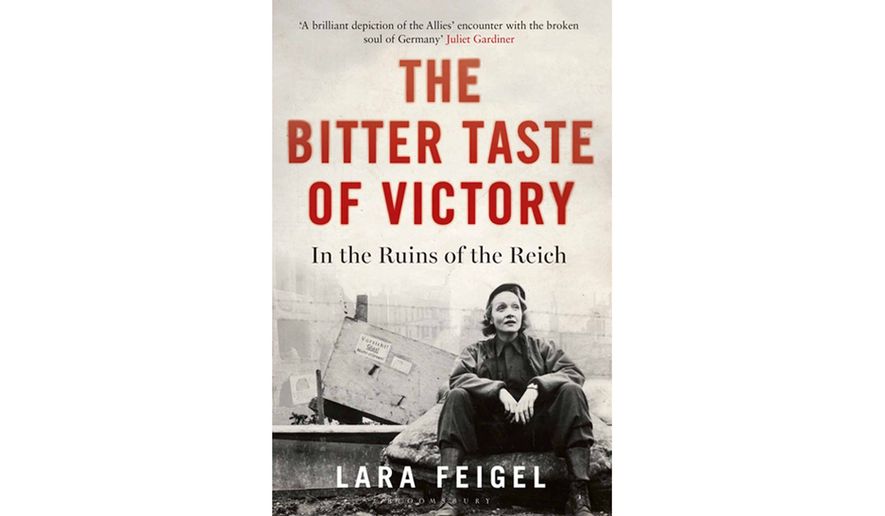OPINION:
THE BITTER TASTE OF VICTORY: LIFE, LOVE, AND ART IN THE RUINS OF THE THIRD REICH
By Lara Feigel
Bloomsbury Press, $32, 443 pages, illustrated
In her study of London during the Blitz “The Love Charm of Bombs,” Lara Feigel, who teaches English at King’s College London, showed with some success what it actually felt like to live in that tumultuous time. She did so through the eyes of five writers. Only one, Graham Greene, is really well-known, three others, Rose Macaulay, Henry Green and Elizabeth Bowen, have some renown, and the fifth, Hilde Spiel, is pretty much unknown.
Since even while writing that book, Ms. Feigel couldn’t resist following some of her subjects to postwar Germany and Austria, it is not surprising that she has made the ruins of the Third Reich and its torturous eventual phoenix-like resurrection the subject of this new, infinitely more complex work. She even features the little-known Spiel again, a rare exception to a canvas filled with superstars not only from the realm of literature like Ernest Hemingway, Thomas Mann, George Orwell and many others, but movies (Marlene Dietrich, Billy Wilder), the military (Gen. James Gavin), and such giants of high-grade journalism, Rebecca West and Martha Gellhorn.
The trouble with using a formula that worked well in one book is that it doesn’t always succeed in another, even when the method employed is altered somewhat. For one thing, the writers in “The Love Charm of Bombs” were really in the thick of things, sheltering from and dodging explosive devices and actually in the case of Henry Green as a firefighter. They were all an integral part of the landscape that kept changing as it was battered night after terrifying night and by day as well. Certainly, they were skilled at communicating the experience and the atmosphere of that time through their writings, but they belonged to London: It was their place. Can the same really be said for the larger-than-life figures who dominate “The Bitter Taste of Victory”?
The closest anyone comes to doing that here is Thomas Mann and his family, but they had been exiled from their native Germany since long before the war, and Mann returned only as a visitor some considerable time after it ended. We hear almost as much about his life in Southern California as his insights into what is going on in his native land and these latter, although of undoubted value, are distanced — and not just physically. The writers Ms. Feigel features are all observers and no matter how acute their observations or whether they dart in and out or stay a while, they do not actually experience what it was like to have to try to exist in that charnel house.
It is not a strength of this book that it comes across as so star-struck and gossipy. There are some chilling examples of the still-smoldering embers of Nazism and its poisonous ideology and horrendous practices. There is some attention to the difficulties of four-power administration, the Berlin Airlift and the evolution of the Cold War. We learn details like how long it took for Joachim von Ribbentrop to strangle at the hangman’s rope. and there are glimpses of how tough life was for ordinary Germans struggling to stay warm and fed. But there is far too much emphasis on the personal dynamics between the famous visitors.
We get snippets from West’s celebrated take on the Nuremberg Trials, but far more about her affair with one of its judges, the American Francis Biddle. Just as we get far less than we should about his view from the bench and indeed from the courthouse than about his seducing, dallying with and dumping the hapless lady. As the story of this romance flits back and forth between Germany and England, one of the most significant events in judicial and military history and one of the most devastated places in mid-century Europe seem little more than backdrops to piquant details and roiling personal emotions.
There is even more about the simultaneous affairs which the thirty-something swashbuckling American general, James Gavin, managed to conduct with Martha Gellhorn and Marlene Dietrich. Gen. Gavin had a distinguished career and played an important role in the conquest of Germany and its aftermath. But we get a lot more about his juggling act with these two women, each a character and then some. Even if one was a world-famous movie star and sex symbol and the other a fair-to-middling writer and a champion collector of literary men’s scalps from H.G. Wells, who wanted to marry her, and Ernest Hemingway, who did and lived to regret it. The book begins with Mr. and Mrs. Hemingway’s competition to cover liberating Germany, a signpost of the author’s continuing emphasis. With Dietrich, we even hear about her enlisting Gavin’s help in contacting her elderly mother, whom he visited, arranging a mother-daughter phone conversation and even a funeral after the old lady’s death; surely not the most noteworthy of his activities in that busy time.
Overall, I found “The Bitter Taste of Victory” left a bitter taste, less because of all the tales of woe in it than because of the trivializing effect of all that emphasis on gossip and glamour. A little more gravitas would have gone a long way to help do justice to an important story.
• Martin Rubin is a writer and critic in Pasadena, Calif.




Please read our comment policy before commenting.